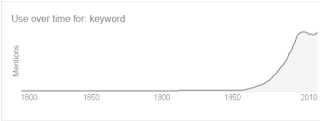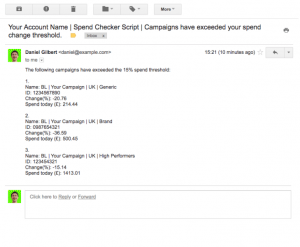Like hashtags, keywords help a computer’s brain (the algorithm) to understand what a piece of content is about. In the case of search engines, what a webpage is about. If you get it right, your web page will perform better than your competitors on search engines. Potential customers will find you first.
This week’s blog will explore what keywords are, why they are so important to get more website traffic, and how businesses can optimise keywords to get better ranking in search engine results.
What is a Keyword?
According to Google, a Keyword is a word or concept of great significance. It can also be a word used in an information retrieval system to indicate the content of a document. This second definition is exactly how keywords work in digital marketing. It is a term that has skyrocketed in relevance in the age of the internet, with the number of mentions in literature increasing as you can see in the timeline below.

When a person searches for something on Google or another search engine, they will type or speak certain words or phrases to guide their search. These are the keywords.
Helping people find you
Choosing the right keywords to use in your marketing copy and search engine optimisation is key to more people finding your website amongst the millions of alternatives. Achieving a higher-ranking result means you will be higher on the Search Engine Results Pages (SERP), and therefore have more people visit your website and a higher potential for income.
The first thing to keep in mind with keywords is that a local search via Google has become commonplace in the age of the digital phone. Search keywords should be optimised for voice search, for people who want to find a café on the go for example.

How search engines use keywords
In technical speak, search engines are “programs that offer users interaction with the internet through a front end, where users can specify search terms or make successive selections from relevant directories. The SE will then compare the search term against an index file, which contains web page content. Any matches found are returned to the user via the front end” (Weideman, 2004).
In other words, a user of a search engine provider such as Google types in some keywords about a topic of interest; and the search engine brain (algorithm) analyses this search query, giving what it considers as the most relevant results based on the keywords.
Websites are giving rankings on individual keywords. For example, you might come up on the first page for digital marketing strategy, but the fourth page of results for social media marketing. This can be based on link popularity (quality and quantity of links), click-through popularity (how many people visit the site), as well as other factors such as keyword density. Google often changes its algorithm and are tight-lipped about exactly how it works. In any case, keywords are very important to get your content found.
“During this process of determining which web pages are most relevant, the SE selects a set of pages which contain some or all of the query terms, and then calculates a score for every web page. This list is then sorted by the score obtained and returned to the end-user” (Zuze & Weideman, 2013)
An extremely high majority of people (something like 80–90 per cent) choose a website that ranks in the first page of results. Out of millions of results, people choose one of the first five or so options by default. Therefore, optimising your search engine result (SEO) is of the utmost importance for customers to find your website.
Keywords and SEO
SEO is a common digital marketing strategy that businesses pay a lot of money for but can do a lot of the work themselves. It is a process of enhancing the ‘searchability’ of a website by optimising your web pages for better ranking in search results pages (SERPs). Search engines crawlers’ sort through the content and use keywords to help identify the most relevant content for a search query, and how a page should rank for that term.
Both on-page and off-page elements of a web site are altered to try and increase the ranking. Keyword usage is one of the most important on-page elements for SEO. Essentially, the higher the frequency of a keyword the better the chance being deemed relevant to that web page.
Choosing your keywords
Take the time to research keywords. It can really make a difference in the quality of your keywords. Keep in mind that you need to think like somebody searching on Google for a business like yours, or information. The keywords should be relevant to your brand positioning, terms easily integrated into your content and copy.
Write a list of potential keywords. First, brainstorm the terms that you think your potential customers might be searching for. Think like your target audience. If you were searching on Google for a business such as your own, what words or phrases would you search for? Write down all your ideas. Using a marketing business as an example, these are some terms you might think of:
· Marketing business
· Marketing consultants near me
· Marketing in Hamilton
· Marketing companies
These are a good start, but they only focus on the core term of Marketing. Other related terms may be:
· Website SEO
· Find more customers
· Social media advertising
· Creating sales funnels
You can expand on each of these, with similar examples for each one. Such as “Social media advertising near me”. If your office has a receptionist who takes customer calls, she will know what sort of inquires you get. Social media hashtags are another way to see what terms people are using, as they work in a comparable way to keywords.
Go into as much depth as you can with this brainstorming process. Create an excel file to use for your keywords to help manage and analyse them, and your data also becomes easily exported. It is valuable to analyse and compare the volume of searches, cost per click and competition for each keyword, so you can be more strategic in your choices. All this information is available by using keyword research tools. This helps you identify how easy it is to achieve a good search position for content using those keywords (keyword difficulty) and whether you can rank at all (keyword opportunity).
Keyword Research Tools
Keyword research helps you understand what search terms are most important to your business, and it also helps give direction to a content marketing strategy. Google offers several great tools you can use for free to find the best keywords for your business. First, go to the Google homepage, and type the industry you are in. For me, Marketing or Branding. The first way to find related terms is to scroll down to the bottom of the page of search results and look at the related searches. This helps you find other relevant search terms that people are looking for related to your industry.
Google Trends shows the trending search terms across the search engine. Check for relevant terms that you can use as your keywords. The tool also allows you to compare different search terms by popularity, region and other variables such as projections.
Google Analytics is another great tool to find information about what keywords are working. You can identify what keyword terms are already bringing traffic to your website. You can find what keywords are bringing people to your website already and use this as a starting point to generating new keyword terms. You can also link a Google Search Console account to give you more data about what people are searching for.
There are many other tools out there to give you valuable information such as search volume, ranking difficulty (useful for content strategy and SEO), keyword value (useful for pay per click advertising), and competition. These tools help you spy on your competition to see what is working for them in terms of keywords. Some of the better tools are:
· Ahrefs
· Google AdWords Keyword Planner
· SEMrush

Managing your keywords
If you have been brainstorming keyword terms as discussed above, and managing them in an excel document, you have a fair volume of options now. Category or topics should separate keywords to make them more manageable. For example, some of them will be more specific to your products, and others for content marketing such as “how does SEO work”.
You can now use these keywords for different purposes and put into different sections of your website and marketing content. Keywords are useful in the following areas on your website:
· The title of your page. Both in the page title and the SEO title, which may be different. This is the first point to help Google understand the relevance of a page. As well as having keywords in your title, include them in your sub-headings, section headers and the page URL.
· The meta description. If you do not have an SEO tool for your website that allows you to write a meta description, then the first 160 characters of the content will automatically come up. This describes the search engine that helps describe the webpage and could be the reason people click or not.
· Social media. Try and include the same keywords in your social media posts. Use a hashtag for your keyword terms, as they work in the same way.
· Photo captions, image file names and links. Many people leave image descriptions and alternative text blank, but these are another key place to leave keywords.
· Throughout your marketing copy, but specifically within the first couple of sentences of each page, and in the last paragraph. Your marketing copy gives you plenty of opportunities to use a range of keywords.
How many keywords should you use? Keyword density
There is a lack of agreement amongst marketing researchers as to what the perfect keyword density is, but there is agreeance that it should be under ten per cent, and the sweet spot is around four to eight keywords per 100 words of text. You want your content to be keyword-rich, but also just as readable. Avoid using some many keywords that it discourages readers. You want your website to draw people in, but you also want to keep them there.
“Unnaturally high keyword densities should be avoided, since it would probably deter human visitors. This is directly in opposition to the reason web site owners desire high rankings: to draw visitors to web pages, and keep them there.” (Zuze & Weideman, 2013)
Keyword “tails”
There are three main types of keywords: short-tail (also called the head), middle-tail (also called body) and long-tail. Businesses should use a mixture of all three types of keywords, as they each have their benefits. For example, short-tail keywords have the highest volume of search but long-tail keywords have the highest chance of a conversion.
Short-Tail Keywords
Short-tail keywords are one or two words?—?for example, Marketing. These keywords are broad and generic and have a high search volume. Also referred to as Seed keywords, these are the platform for your list of keywords. Sorting your list of keywords by volume will produce a good list of short-tail keywords. The rule of thumb is, the shorter the keyword, the more competition there will be. Short-tail keywords are not very targeted, so it will be an irrelevant search result for many people. The conversion rate is very, extremely low.
Middle-tail keywords
These keywords tend to consist of three to four words. An example of a middle-tail keyword would be “Digital Marketing in Hamilton”. More specific than short-tail keywords, and middle-tail keywords receive less search volume, but are more likely to convert. These keywords are moderately competitive and have more search volume than long-tail keywords.
Long-Tail Keywords
Consisting of four or more words, long-tail keywords are specific and detailed and have low search volume. An example could be “Content marketing strategy for small businesses”. These can be specifically related to your niche market and geographic location. The big advantage of these keywords is that your competition is low and the customers these keywords attract are more likely to convert as the keywords are more targeted toward their specific needs.
The danger of writing purely for SEO
As well as writing copy to be keyword-dense to help with SEO, it needs to be well-written and compelling enough to connect with your reader. Or they will leave, and your ranking will start to suffer if you have a high bounce rate (People who leave instantly instead of viewing other pages). Avoid keyword stuffing, keywords should comprise of around five to ten per cent of your total word count. Search engines will penalise anyone stuffing the same keywords numerous times into a piece of content. Have your main keyword in mind and write alternatives naturally into your content. While you want to include long-tail terms, doing so naturally is not easy when they are so specific. A short-tail keyword such as marketing strategy is far easier to include in copy than “Content Marketing Strategy in Hamilton”
“Web sites and web pages are blacklisted (Yung, 2011) and excluded from search engines’ (SE’s) indices due to “black hat” (unethical) techniques employed on them. One of these techniques is keyword stuffing: the practice of repeating important keywords on a web page to the point where the excess goes against the grain of readable English text.” (Zuze & Weideman, 2013)

Keywords and Blogging
When choosing your keywords, do not make the mistake of just choosing commercial ones. In the first stages of the buyer journey, consumers require information about their problem. Having content on social media and in blog posts that provide information are a suitable place to leave relevant keywords. ‘How does content marketing work?’, for example.
Blog posts are one of the easiest ways to use keywords strategically on your website. A good blog post will be laden with short, middle and long-tail keywords.
Keywords on YouTube
Keywords are just as important on YouTube as they are on your website. YouTube works comparably as a search engine, it gives users relevant video results to their search term. Having optimised keywords in your Channel keywords, your profile description as well as in your video keywords helps give YouTube information and context about your channel. This can help increase the visibility of your channel as your videos become more likely that they become a recommended video to other users, based on what they are watching. YouTube learns what type of content you produce and who your target audience is.
Digital & Social Articles on Business 2 Community
(64)








